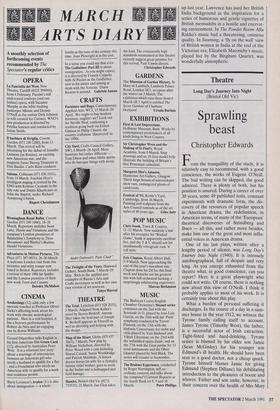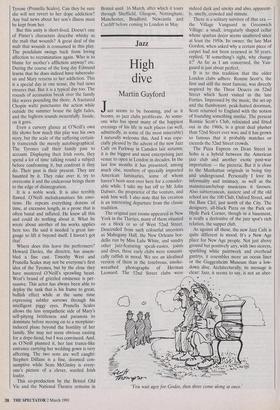Theatre
Long Day's Journey Into Night (Bristol Old Vic)
Sprawling beast
Christopher Edwards
rom the tranquillity of the study, it is relatively easy to recommend, with a good conscience, the works of Eugene O'Neill. The bad writing can be skipped, the good admired. There is plenty of both, but his position is assured. During a career of over 30 years, some 49 published texts, constant experiments with dramatic form, the dis- covery of the resources of popular speech in American drama, the redefinition, in American terms, of many of the 'European' theatrical discoveries of Strindberg and Ibsen — all this, and rather more besides, make him one of the great and most influ- ential voices in American drama.
One of his last plays, written after a lengthy period of silence, was Long Day's Journey Into Night (1940). It is intensely autobiographical, full of despair and very long. As you emerge exhausted from the theatre what, in good conscience, can you report? Here is a great playwright who could not write. Of course, there is nothing new about this view of O'Neill. I think it probably applies to most of his work. It is certainly true about this play.
What a burden of personal suffering it discharges. In the course of a day in a sum- mer house in the year 1912, we witness the Tyrone family calling itself to account. James Tyrone (Timothy West), the father, is a successful actor of Irish extraction. Tight-fisted and hard-drinking, Tyrone senior is blamed by his older son Jamie (Sean McGinley) for his younger son Edmund's ill health. He should have been sent to a good doctor, not a cheap quack. Tyrone himself blames Jamie for giving Edmund (Stephen Dillane) his debilitating introduction to the pleasures of booze and whores. Father and son unite, however, in their concern over the health of Mrs Mary Tyrone (Prunella Scales). Can they be sure she will not revert to her dope addiction? Any bad news about her son's illness must be kept from her.
But this unity is short-lived. Doesn't one of Pinter's characters describe whisky as the malt that wounds? A great deal of the malt that wounds is consumed in this play. The pendulum swings back from loving affection to recrimination again. Who is to blame for mother's affliction anyway? etc. During the course of the long day Edmund learns that he does indeed have tuberculo- sis and Mary returns to her addiction. This is a special day in one sense; the bad news ensures that. But it is a typical day too. The rounds of accusation break over the family like waves pounding the shore. A fractured Chopin waltz punctuates the action while outside the summer house the light fades, and the foghorn sounds mournfully. Inside, on it goes.
Even a cursory glance at O'Neill's own life shows how much this play was his own story, but the scale of the suffering certain- ly transcends the merely autobiographical. The Tyrones call their family past to account. Displaying their Irish roots, they spend a lot of time talking round a subject before confronting it, but confront it they do. Their past is their present. They are haunted by it. They rake over it, try to overcome it and the endeavour brings them to the edge of disintegration.
It is a noble work. It is also terribly flawed. O'Neill melodramatises his emo- tions. He repeats everything dozens of time, at excessive length, in a prose that is often banal and inflated. He knew all this and could do nothing about it. What he wrote about another of his works applies here too. He said it needed 'a great lan- guage to lift it beyond itself. I haven't got that'.
Where does this leave the performers? Howard Davies, the director, has assem- bled a fine cast. Timothy West and Prunella Scales may not be everyone's first idea of the Tyrones, but by the close they have mastered O'Neill's sprawling beast. West's brand of grizzled eminence is per- suasive. This actor has always been able to deploy the tank that is his frame to great, bullish effect while at the same time expressing subtler sorrows through his intelligent piggy eyes. Prunella Scales allows the less sympathetic side of Mary's self-pitying brittleness and paranoia to dominate before moving on to a morphine- induced plane beyond the hostility of her family. She may not seem obvious casting for a dope-fiend, but I was convinced. And, as O'Neill planned it, her last trance-like entrance carrying her wedding gown is very affecting. The two sons are well caught: Stephen Dillane is a fine, doomed con- sumptive while Sean McGinley is every- one's picture of a clever, sozzled Irish loafer.
This co-production by the Bristol Old Vic and the National Theatre remains in Bristol until 16 March, after which it tours through Sheffield, Glasgow, Nottingham, Manchester, Bradford, Newcastle and Cardiff before coming to London in May.



















































 Previous page
Previous page